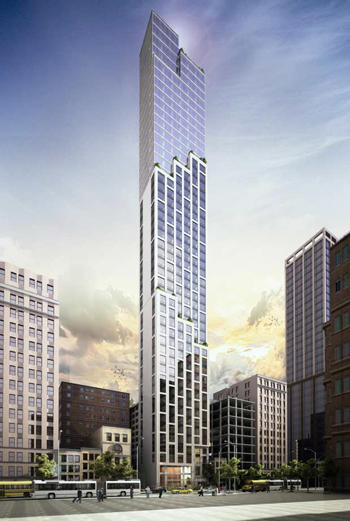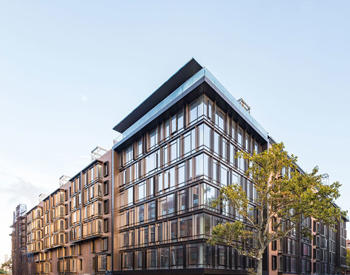In the midst of an inventory glut, brokerages are taking their grievances to court.
Since June, several firms have sued developers — seeking monetary compensation for what they deem were unfair practices or unpaid fees. The cases highlight the somewhat cyclical nature of this type of litigation: When the market gets tough, companies are much more prone to sue.
“If pockets were full and markets were good, people might take a more conciliatory approach,” said Nancy Packes, a new development marketing specialist. “But it’s not easy for new development brokers right now.”
Last month, Corcoran Sunshine Marketing Group filed a $30 million suit against the developers of a supertall condominium at 111 West 57th Street, claiming the brokerage was terminated without warning on May 16. While JDS Development Group and Property Markets Group contend that the brokerage missed sales benchmarks, Corcoran said in court documents that infighting, lawsuits and self-sabotage “undermined and frustrated” its ability to market units.
Corcoran alleged that in 2016, PMG boss Kevin Maloney “commenced a publicity campaign underscoring his lack of desire to market the Building” until market conditions changed.
If pockets were full and markets were good, people might take a more conciliatory approach. Nancy Packes
“If the market were red-hot, people would be buying off plans, throwing checks down, and it’d be great,” Maloney told Bloomberg at the time. “But if you have a market where you think marketing would be ineffective for now, why would you launch and spend the money? Wait.”
Meanwhile, marketing of 111 West 57th went to rival Douglas Elliman, which recently hired the building’s former sales director from Corcoran. In a situation like that, a lawsuit can be a way for the brokerage to save face, said Terrence Oved, an attorney.
“The best defense is a good offense,” he said. It’s “as if to say, ‘Hey, it wasn’t that we were let go for doing bad job.’”
Halstead Property Development Marketing is also seeking compensation after getting booted from a project. The brokerage sued Xinyuan Real Estate, the Chinese developer of Williamsburg’s Oosten condominium, alleging it’s owed nearly $1.3 million.
According to the complaint, Halstead was hired in 2013 to market the 216-unit luxury development. But in October, the firm was allegedly fired without cause in the midst of a shakeup of Xinyuan’s New York team. Halstead claims it’s still owed money related to salaries, benefits and marketing expenses.

131 East 47th Street in Turtle Bay
Then, this month, Town New Development sued entities tied to New Empire Real Estate Development. It claimed Bentley Zhao’s firm stiffed the brokerage out of $210,000 in consulting fees and a $2.2 million termination fee. Town, which shuttered its resales and leasing operation in April, is seeking money owed plus $5.45 million in damages.
What’s straining the relationships between developers and the brokerages they hire is the time it takes to move units. And there’s no doubt the pace has been slow. In the second quarter this year, the median sales price of new development condos and co-ops in Manhattan slid 19 percent, according to a Elliman market report. At the same time, active listing inventory climbed 11 percent, versus a year earlier, as the number of sales closed dipped 17 percent.
“There’s a litigation seasonality in new development,” said Jonathan Miller, of real estate appraisal and consulting firm Miller Samuel. “When the market is moving at a slower pace than it was when the marketing effort of a project began, there’s a lot more time for things to go wrong in the relationship.”
Previous down cycles have been no exception. In 2009, for example, some of the same players were taking up legal fights with developers. Corcoran Sunshine sued the developer of Tribeca’s Five Franklin Place condo, alleging unpaid fees after its contract was terminated. Halstead filed a suit against the developer of the Upper West Side condo conversion Park Columbus — claiming it was owed money for outstanding expenses.
There are parallels in the commercial real estate industry, too. Amid the tough retail environment, Gap is taking its landlord Westfield to court, claiming the company had to pay more than its share of expenses at more than two dozen shopping centers. While those disagreements are common, litigation may become more frequent as retailers cope with e-commerce competition.
Airing these conflicts publicly tends to be a last resort, Packes said. Litigation can be a pricey process that strains relationships between parties, but ultimately, the “immediacy of situation simply outweighed all the other consequences.”
“Contracts don’t foresee that there’s going to be a hiccup in the market that will cause the developers’ interests to diverge from the sellers’ interests,” she said.
And there’s little indication that it’ll get easier for new development brokers to move product. By 2019 — when the number of new condos in Manhattan is set to hit 7,900 — it may take nearly 4.5 years to sell out all the new development inventory, according to Miller Samuel. That’s more than double the amount of time that’s considered healthy.

Oosten at 429 Kent Avenue
At the end of the day, the resolution of these complaints hinges largely on the language in the agreement.
“There are many millions of dollars at stake on each project, and the contracts say what they say,” said Town’s Andrew Heiberger. “The party that is contractually protected will prevail.”
Andrew Gerringer, managing director of new business development at The Marketing Directors, shared a similar sentiment: If a contract is disputable, the developer will end up owing money.
“You should really have your i’s dotted and t’s crossed for how and when you’re going to get paid,” he said. “Everybody starts paying attention when the market slows down, and they want a reason to get out of deal or negotiate a better deal.”
